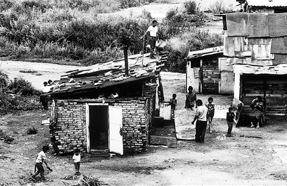
At a lecture (6th March) dedicated to ‘Futures’, we watched a footage of the destruction of Pruitt-Igoe. Originally, this estate was an attempt to house the inhabitants of St Luis, Missouri as a response to the post-WWII housing problem.
Pruitt-Igoe could be seen as ‘slums replaced by vertical ghettoes’. Having seen the footage, I could not help but to have a memory of Czech Roma brought to my attention. We always talk about ethics in design, usually naming designers as the ‘gods’ who could and should make a long- rather then short-term difference. When it comes to slums however, is it not also the politicians who become the designers? The ‘designers’ of peoples’ lives?
In the recent years, a problem of devastation of the town centre of Vsetin (a town in north-eastern part of The Czech Republic) was blamed on Romanies who lived in slum-condition houses nearby (they can actually thank themselves for this state). As a result, they were ‘removed’ to the suburbia of Vsetin to a housing system resembling Pruitt-Igoe of a better condition. Jiri Cunek, a mayor turned politician was responsible for this ‘removal’.
He became both popular with the public and infamous with the ethic minority in question. A recent program (5th March) on a BBC Radio 4 addressed this particular problem of Czech Romanies. It focused on one family that was rather ‘riotous’ about discrimination. ‘Not again’ was my response to this. Shortly after my thought, Jiri Cunek expressed my feeling. Roma people grab any opportunity of attention; foreign involvement is even better.
Of course there are people who have been forced to live in such conditions. Responding to Samuel Clarke’s blog and Mike Davis’s article entitled ‘Planet of Slums’, natural disasters or poor economic development of a country add to poor living conditions. It has also been suggested that the pressure of urbanization is turning rural areas into slums. In other words, the slum-like living conditions come to previously normal rural places. At this point, I bring back the economy and politics of a country.
Yet again, the politicians become the ‘designers’ of people’s lives. However, they are after all just the politicians. Therefore, in terms of design they can easily express themselves saying: ‘Should I weasel my way out of every decision?’1 (a design related that is). Hopefully not. They cannot rely on architects or product designers to solve all the problems. It is the country’s responsibility to ‘serve’ its people. Especially if a natural disaster strikes.
As for the Czech Roma mentioned above, no matter what the design. For centuries they travelled from place to place living a nomadic life and this is one of the reasons why it may be difficult to make them settle down in one place. They are used to travelling and visiting each other. As a result, a flat aimed to house a family of five will need to house fifteen and the destruction of a place is inevitable. This is a cultural rather than designer clash.
One has to live there to understand. There is no point to criticise a problem of one country if one has not actually lived there. Hence, BBC Radio 4 program on discrimination.
1 Fischli, P., Weiss, D. (2006), Will Happiness Find Me? (quotes translated by Catherine Schelbert), Koenig Books, London
Davis, M., (2006), Planet of Slums, Verso, London
Fischli, P., Weiss, D. (2006), Will Happiness Find Me? (quotes translated by
Catherine Schelbert), Koenig Books, London
BBC Radio 4 (5th March 2007)
http://en.wikipedia.org/wiki
http://romove.radio.cz/en/
No comments:
Post a Comment
Note: only a member of this blog may post a comment.